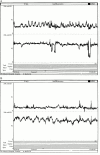Effects of short term sacral nerve stimulation on anal and rectal function in patients with anal incontinence
- PMID: 10026329
- PMCID: PMC1727421
- DOI: 10.1136/gut.44.3.407
Effects of short term sacral nerve stimulation on anal and rectal function in patients with anal incontinence
Abstract
Background: Some patients with faecal incontinence are not amenable to simple surgical sphincter repair, due to sphincter weakness in the absence of a structural defect.
Aims: To evaluate the efficacy and possible mode of action of short term stimulation of sacral nerves in patients with faecal incontinence and a structurally intact external anal sphincter.
Patients: Twelve patients with faecal incontinence for solid or liquid stool at least once per week.
Methods: A stimulating electrode was placed (percutaneously in 10 patients, operatively in two) into the S3 or S4 foramen. The electrode was left in situ for a minimum of one week with chronic stimulation.
Results: Evaluable results were obtained in nine patients, with early electrode displacement in the other three. Incontinence ceased in seven of nine patients and improved notably in one; one patient with previous imperforate anus and sacral agenesis had no symptomatic response. Stimulation seemed to enhance maximum squeeze pressure but did not alter resting pressure. The rectum became less sensitive to distension with no change in rectal compliance. Ambulatory studies showed a possible reduction in rectal contractile activity and diminished episodes of spontaneous anal relaxation.
Conclusions: Short term sacral nerve stimulation notably decreases episodes of faecal incontinence. The effect may be mediated via facilitation of striated sphincter muscle function, and via neuromodulation of sacral reflexes which regulate rectal sensitivity and contractility, and anal motility.
Figures

References
MeSH terms
LinkOut - more resources
Full Text Sources
Other Literature Sources
Medical
